The latest interview in the Ole Miss Retirees features Dr. Jack Barbera. The organization’s mission is to enable the university’s faculty and staff retirees to maintain and promote a close association with the university. It is the goal of the Ole Miss Faculty/Staff Retirees Association to maintain communication by providing opportunities to attend and participate in events and presentations.
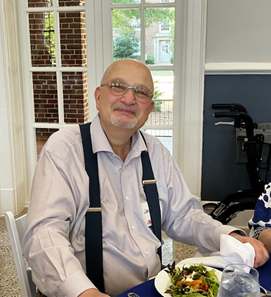
Brown: This Q & A began with a request from me to Dr. Barbera several months ago. He was reluctant as others have been, but I’m proud to say, he came through and I know you will enjoy this article.
Barbera: Thanks for your patience! Every time I thought of your questions, a stream of reveries would prevent me from just sitting down and writing, but the interview has been on my mind.
Brown: What’s your earliest memory?
Barbera: Looking out the window of our second story apartment, perhaps from a highchair, and saying “Man, man.” This was in our kitchen, and my mother looked out the window and didn’t see anyone on the sidewalk below or the roof of the commercial building across the street. Finally, she realized I was looking at a bas-relief of a man’s face on the wall opposite the window. I recounted this memory to my brother, Lewis, and he said the face was of Neptune. I Googled my childhood street address and rotated the view to see opposite. The bas-relief is still there with a fish at the top, some seashells, and a bearded crowned man at the bottom. So, I guess my brother is right about the face being Neptune. I emailed him the image and he said he hadn’t seen that bas-relief for over 70 years. Our apartment was on 246th Street in Bellerose, New York, and then my family moved farther out on Long Island to a house in Huntington.
Brown: How old were you when you moved?
Barbera: Old enough to start fifth grade in Huntington. My parents purchased a house in a development with one-acre plots. There were a lot of dogwood trees on our property, and I think it was the first time I realized flowers could grow on trees. I guess I changed from a city boy to a country boy, if the suburbs can be called country. The Neptune bas-relief and the traffic sounds at night on Jamaica Avenue below my bedroom window, as well as the movie theater across Jamaica Avenue where I spent Saturday afternoons watching cartoons and cowboy movies, were as familiar to me in my Bellerose childhood as the dogwoods, cricket sounds, and birdsong in Huntington became. All streets in our Huntington development were named after birds. We lived on Bluebird Lane, which went up a hill, and in the winter my brother and I would go ice-skating on the pond at the top of the hill. Buying our house was a big step financially for my blue-collar parents who were acutely aware that many of my aunts and uncles feared they were foolishly getting in over their heads.
Brown: Tell me more about your parents.
Barbera: My dad died in 2001 and I noticed in his coffin, on the lapel of his jacket, a pin I had never seen. My brother told me my dad never saw it either because it arrived in the mail the day he died. It was sent to him by the carpenters’ union for 50 years membership. My dad had been a sheetrock carpenter several decades – long enough to receive a pension from the union. Few sheetrock carpenters continue with that work long enough to retire with a pension and thus, if they live long enough, get a pin for 50 years of union membership. It’s backbreaking work. It’s a young man’s game. I remember when I was in high school I went once to help my dad at work. We stood on sawhorses and I stretched both of my arms above my head and held one end of the sheetrock against the ceiling rafters, while my dad stood at the other end holding it up with his left hand and head while he hammered in the nails with his right hand. It didn’t take long before my arms began to ache and I wondered how my dad could do this work day after day. And I realized I didn’t want to become a sheetrock carpenter.
My dad was patient, had a dignity about him – he was a quiet man. I remember when I was seven years old seeing a John Wayne movie my mother loved, about an American prizefighter who retired and moved to Ireland after an opponent died from his blows in the ring. It was called “The Quiet Man,” and I suspect my mother liked it so much because John Wayne in that movie played the strong silent type, and reminded her of my father. I did not inherit my dad’s quietness. In fact, some of my aunts and uncles used to call me a chiacchierone (chatterbox). In this I took after my mother, who was outgoing and vivacious.
Brown: Tell me more about your mother.
Barbera: She was something of a tomboy as a child, loved learning, and did very well in school. Shortly after she started high school, however, her father said she had to work to help support the family. She was the oldest of 10 children. Her father, we called him Babà, allowed her to go to beauty school and paid to set her up in business with the condition she pay him back.
When only seventeen my mother had a successful one-woman business, Jeanne’s Beauty Shoppe. After she got married my folks lived in the Bellerose apartment above the shop, and when my brother and I came along we lived there too.
When we moved to Huntington my mom worked in another beauty shop for someone else.
Brown: You mentioned that your mother’s father set her up in business. Do you know anything about your maternal grandparents’ early lives?
Barbera: Babà was born Salvatore Albanese in Raffadali, a town in Sicily. His family was poor and he grew up illiterate. Sicily offered him no future, so his parents sent him to America in steerage on a ship that landed at Ellis Island. When I came to Mississippi and began doing research on the Italians in Tennessee Williams’ plays, I learned that most Sicilian immigrants in Mississippi entered through the port of New Orleans, which surprised me, as my grandparents on both sides had entered through Ellis Island, and I thought all immigrants entered this country that way, greeted by the Statue of Liberty. After he was processed by Immigration, Babà went to a town in upper New York where bricklayers were being apprenticed.
We called my mother’s mother Mamà. She was born Maria Mercaldo in a small town outside of Naples, but when she was about two years old her family moved to France because her father was a singer in a local opera company that went on tour there. When she was 12, the opera company travelled to America, so the family followed. Because Mamà’s father had relatives in upstate New York, her family went to live with them. Her father played his guitar and sang in the saloons around town. Eventually the family moved to a small house of their own and Mamà’s mother, Nancy, whom we called Mama Nonna, took in boarders and made the meals for all. One of the boarders, Babà, married Mama Nonna’s daughter, Mamà. He was 23 and she was 16. Two months later the bricklaying jobs ended, so Babà bought an old horse and second-hand wagon, and went through the streets selling fruit and vegetables. Eventually he found a building in the Italian-settled area of Brooklyn, with rooms in the back for his family and a store in the front out of which he could sell produce. Babà was shrewd and made money investing in properties that he could rent and eventually sell at a profit, which helped him raise his family of ten children.
By the time I was born Babà and Mamà lived in Bellerose, a few blocks from our apartment. Mama Nonna’s husband had passed away several years before I was born, and she lived with Babà, and Mamà. As a child I used to walk to their house on my own. Mama Nonna would make sfinge (a fried dough ball sprinkled with powdered sugar) just for me, because she knew I loved them. After I came to Mississippi and drove down to New Orleans for the first time, I went to the Café du Monde and, like Proust and the Madeleines, was swept up in nostalgia by the beignets, which were so close in taste to sfinge.
Brown: You’ve said so much about your maternal grandparents, what about your paternal grandparents?
Barbera: When my family was still living in Bellerose we’d drive to Brooklyn almost every Sunday to visit them. I hardly remember my paternal grandfather, as he died when I was very young. After my family moved to Huntington my paternal grandmother came to live with us – we called her Mama Dear. She was born Francesca Giambalvo, in the Sicilian town of Santa Margherita di Belice.
Mama Dear wanted to come to America, perhaps to join her sister, Margaret, with whom she was very close. So at the age of 15 or 16 she arrived at Ellis Island and Grandaunt Margaret greeted her. Mama Dear had a ticket for a room on the boat, but once it was underway she was forced into steerage and her belongings were stolen. In America she worked in a tenement house with her sister, sewing zippers into men’s pants for 2 cents a zipper. They lowered a basket from their window in the morning and a man on the street filled it with pants and zippers. At the end of the day, they lowered the basket again, filled with the finished products, and their payment was placed in the basket. Mama Dear never went to school, couldn’t read or write, but she could count her money.
Grandaunt Margaret introduced Mama Dear to Luciano Barbera who was at least 10 years her senior. They got married and had three sons, of whom my father was the middle child. I don’t know my paternal grandfather’s backstory, except that he was another Sicilian immigrant, and in this country was a landlord and, I believe, a tailor.
Mama Dear loved me and my brother very much, and I recall fondly the Sicilian pastries she made called cassateddi, deep-fried turnovers filled with sweetened ricotta and candied fruit. They are very labor intensive. One afternoon, when we were living in Huntington and my mother and Mama Dear had been working for hours filling a large platter with cassateddi, three of my mother’s uncles dropped by. My mother seated them at the kitchen table and served the pastries, warm from the fryer and dusted with powdered sugar. Each grand uncle ate multiple pastries, and in about 20 minutes most of them were gone. Fortunately my mother had rescued a few, putting the plate on the dining-room sideboard so there would be some for us after dinner.
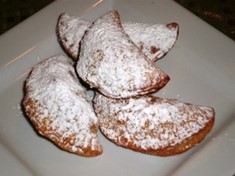
Brown: You’ve spoken about your parents and your grandparents. What about your siblings?Barbera: I have one sibling, my brother. My sister-in-law, Janet, was valedictorian of our high school class and one of my best friends in high school. My brother is about a year and a half older than me. We are like night and day. He’s interested in sports and, when a boy, used to collect baseball cards. The cards came in a package with a square piece of bubble-gum that he’d give to me. The gum was where my interest in baseball began and ended. I was bookish: my mother used to say I always had my nose in a book.
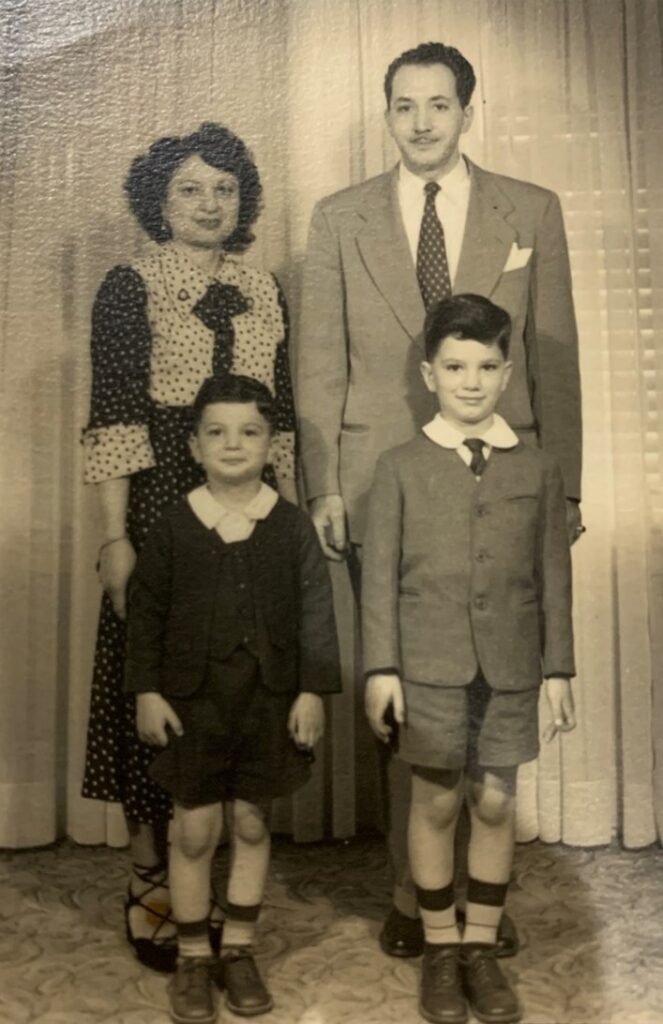
In Bellerose my brother was a Boy Scout, and I was an altar boy. In later life he had a successful business career working for Xerox and I became an English Professor. In retirement he’s taken up archery and won numerous awards in his age group, whereas I like to create ceramic sculptures. Our political views are also very different, but family transcends politics. During the Vietnam War I used to say we had 2 C.O.s in the family. Lew was a Commissioned Officer (a Lieutenant in the infantry), and I was a Selective Conscientious Objector (not legally a thing). When I was a university student expecting to have to go to jail for refusing the draft because of my opposition to the war, he wrote to me from Germany, where he was stationed, saying the military had a policy of only one member in a family at a time serving in Vietnam, and that limited to a one-year period. He offered, if I agreed to be drafted (so I wouldn’t have to go to jail), to go to Vietnam and keep volunteering for another year, until my service obligation was fulfilled. I couldn’t take him up on his offer in principle, but will never forget it. As it turns out, a draft lottery was instituted and my birthday got a high number, so to my relief I never did have to go to jail.
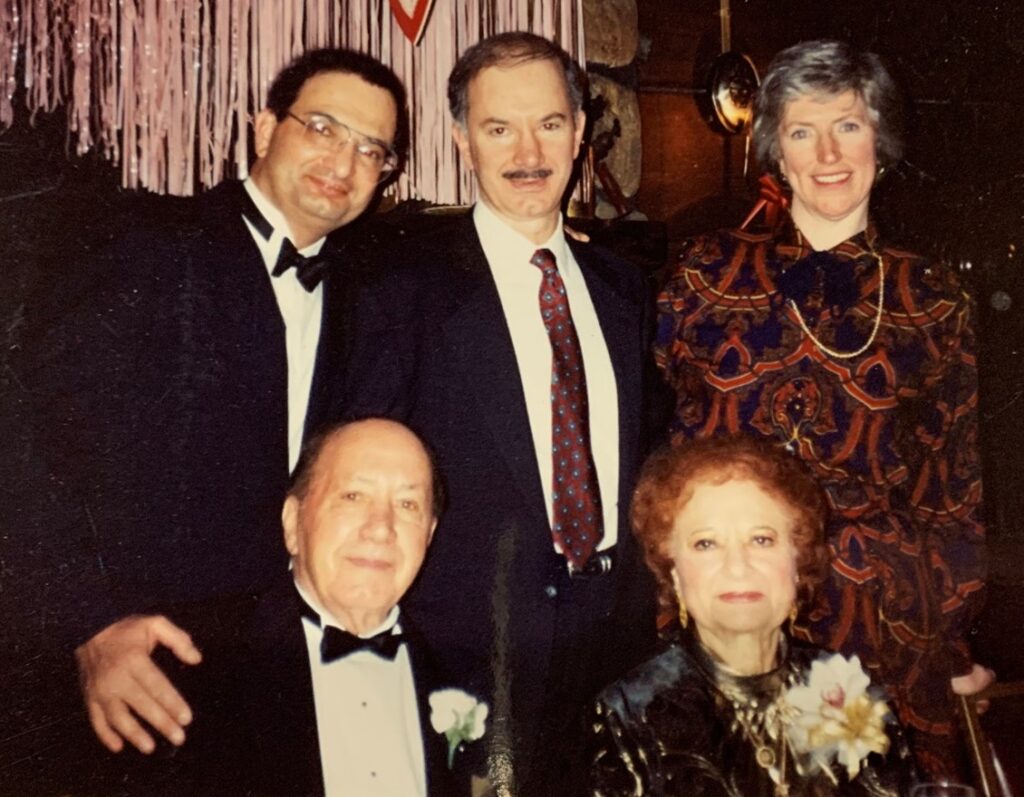
Brown: You mentioned being an altar boy. Can you say more about that?
Barbera: In Bellerose I was the youngest altar boy in our parish. For a while I considered becoming a priest, and in college becoming a Trappist monk. Eventually I realized my vocation was in becoming just what I became, an English Professor.
As an altar boy I remember walking several blocks on Friday evenings to our parish church to assist at the Rite of Benediction. Folks didn’t seem to be worried in those days about a little boy walking around a city neighborhood on his own. Benediction means a blessing, and it is a centuries-old church service in which a consecrated host, which for Catholics is truly the Body and Blood of Christ, is placed in a monstrance, a container with a window through which the host can be seen.
Brown: You mentioned considering being a priest. Is there anything else you thought about being when you grew up?
Barbera: A lawyer like Clarence Darrow. I sawthe movie, Inherit the Wind, which made a great impression on me. I had been a member of my high school Debate team and was skilled at argument. However, I came to think that as a defense lawyer I might argue brilliantly and get someone off who was guilty and might go on to commit another unspeakable crime, and as a prosecutor I might argue brilliantly and put away someone who was innocent. This bothered me, and I decided I didn’t want to be a lawyer after all.
Brown: To what or whom do you attribute the biggest successes in your professional life?
Barbera: As to the what, my education at the University of Chicago, and as to the whom, my friendship with William McBrien. I’d started college at St. John’s University in Jamaica, New York, but felt most students there were more interested in getting a degree and having a fun time than they were in getting an education. I must have been insufferable. During a semester break I visited a high school friend who’d gone to the University of Chicago. With its emphasis on the life of the mind, I realized it was the school for me. I applied as a transfer student, they accepted me, and I chickened out. During my second year at St. John’s I felt I’d made a big mistake, asked Chicago to accept me again, they did, and I went.
Brown: You mentioned an important person who contributed to your professional success, William McBrien. Who was he and how did he help you?
Barbera: Bill was my English Professor when I started college in the Honors Program at St John’s University. He introduced me to a world of sophistication and learning and, after I transferred to Chicago, we kept up a friendship. Bill eventually moved to Hofstra University and became editor of the journal, “Twentieth Century Literature.” One day, after I’d been teaching at Ole Miss for about two years, Bill mentioned he had travelled to the University of Tulsa to advise them on a literary journal they were thinking of starting. While he was there they showed him boxes of the papers of poet and writer Stevie Smith that they’d recently purchased and hadn’t yet processed for their library. I told him I was interested to hear that because I’d been thinking of writing about her as a change of pace from my dissertation and early publications on the American poet, John Berryman. Bill said he also was thinking of writing about her, so we decided to collaborate on a biography. Our research and writing on Smith spanned about eight years and resulted in three books that were published in England and America.
Brown: Tell us how/when your Ole Miss story began? What did you know about Ole Miss before you accepted a position here? What attracted you to Ole Miss? What was the interview process like?
Barbera: In early 1976 I was still at work on my dissertation when the University invited me to come down for a job interview. I had applied to several schools and must confess I didn’t know much about Ole Miss except that there was a tenure track opening in the English Department, something rare at the time. I flew down and was wined and dined and given an itinerary of administrators and faculty to meet, an itinerary that kept referring to me as “Dr. Barbera,” although I hadn’t yet received my Ph.D. I sheepishly mentioned this to Professor Evans Harrington, who graciously said, “Oh, but you will.”
Evans asked if I wanted him to take me to Rowan Oak, which I heard as Roanoke. “Isn’t that a bit far?” I asked. He informed me that William Faulkner’s home, Rowan Oak, was in Oxford, and told me of the English Department’s pride in its annual Faulkner Conference. He asked if I’d like to teach a course on Faulkner if I got the job at Ole Miss. I didn’t want to give offense but had to tell the truth. I’d read The Sound and the Fury and a few of Faulkner’s stories, I said, but was much better prepared, and would much rather teach, courses on other writers. However, if the English Department wanted me to teach a course on Faulkner, I was sure I could put one together and do a good job. “No, no,” he replied, “we already have too many people here who want to teach Faulkner.”
After showing me Rowan Oak, Evans brought me to the next person on my itinerary, Professor Charles Cannon, who invited me to address his Shakespeare class. This took me by surprise. What would the students think of me, I wondered, knowing of my sinking prospects if the encounter was a flop. Charles introduced me to his class, noting that Ole Miss wanted to hire someone with a traditional degree in literature who also could teach courses in film, a first for the English Department.
The next person on my itinerary was the Department Chair, whom I joined in the Bondurant Faculty Lounge. He said I should address a class during my visit and, as luck had it, a student who’d been in the Shakespeare class passed by, saw me in the lounge, and stopped to say how much he and the class had enjoyed my visit. I got word in Chicago, a few months later, that Ole Miss offered me the position.
Brown: Did you have any misgivings about accepting the job?
Barbera: It was the only offer I had. Despite the southern hospitality I experienced during my interview in the spring, I confess I was apprehensive. During my college years I’d attended anti-war rallies, and even organized one in my home town. I also was aware of, and upset by, outrages in the South committed against Blacks in the struggle for Civil Rights. But I’ve learned there is more to the state than poverty and racial violence: such literary luminaries as William Faulkner, Eudora Welty, and Tennessee Williams came from Mississippi, as did the rich legacy of the Blues. The people, I found, are like people everywhere, a mixed lot, but mostly nice. Over the years I’ve seen Ole Miss progress in its efforts to become a more inclusive and welcoming place. It has also greatly progressed academically, especially under the transformative leadership of Chancellor Robert Khayat, and continues to progress under subsequent chancellors.
Brown: What are some of your earliest memories of Ole Miss?
Barbera: I want to mention three terrific Mississippi women who enriched my life by their friendship, but have now passed away: the novelist Josephine Haxton (pen name, Ellen Douglas), the singer and pianist, Dardanelle Hadley, and the painter, Lynn Green Root.
Jo became a writer-in-residence at UM three years after I arrived, and we hit it off. Before the fall semester of 1986, on my drive back to Oxford from New York, I’d heard on my car radio songs from Paul Simon’s just released “Graceland” album. In Charlottesville I bought a tape of the album to play in my car and, when I arrived in Oxford, called Jo and asked her to come over to my apartment. We were being transported by the songs.
I first heard the music of Dardanelle Hadley at Square Books, played over the store’s sound system. She was at the time the Music Department’s artist-in-residence. I enjoyed her live performances on campus, in Memphis, and once in the bar above City Grocery. I’d stopped by to hear her but couldn’t stay to the end of her set. When I got to the sidewalk, her music was wafting from the open windows. The combination of Dardanelle’s sophisticated singing, the humid night air of an Oxford summer, and the view of the Lafayette Courthouse, seemed to me to be magical.
Then there is Lynn Green Root, whom I knew as my student the first semester I taught at Ole Miss. I recall that during the semester she had an exhibition of her paintings at a gallery on the Square. We became friends and the following year she invited me to Jackson, Mississippi, to meet her parents and to attend Thanksgiving dinner at the home of her Aunt Winifred, who’d written “The Southern Hospitality Cookbook.” Winifred Green Cheney had a circle of women friends in Jackson on whom she’d try out her recipes. One of these was Eudora Welty, who wrote an Introduction to the cookbook and who had a dish in it named after her, Squash Eudora. With characteristic wit Lynn told me it was the name of a dissident Jackson literary group.
She was the zaniest person I’ve ever known, and I loved her for it. Two paintings I have by her are among my prized possessions. One depicts the apartment she lived in at the Flamingo on University Avenue, with an easel, chair, and waste basket, and the other depicts a pickup truck going down the road with two children in the truck bed.
Brown: Describe your perfect day.
Barbera: Eating and laughing with friends, and perhaps seeing a movie or play together.
Brown: I understand that you have a talent for ceramics and that your work has been exhibited. How did this come about?
Barbera: I signed up for a beginning ceramics course at Ole Miss in the early 90s because I wanted to make some trays to put under my potted plants, but the minute I put my hands in clay I fell in love. It didn’t hurt that Ron Dale was an inspiring teacher as well as an expert potter.
Ron was very serious and encouraged us to submit our work to exhibitions. I did, once, and my piece was accepted for a juried show in 1997 at the Hickory Museum of Art in Hickory, North Carolina. I’d submitted a whistle in the shape of a cockatoo that I called “Cockatoot.” Perhaps because Ron was so serious, I couldn’t help but tease him about a prestigious show at the Mississippi Museum of Art featuring the work of only nine Mississippi artists selected by a guest curator from New York. Ron’s work was chosen, as was Jere Allen’s, also from our Art Department. I joked saying I too had a piece in the show. Ron said I did not. I said I did. He insisted I did not, and was not amused. Well, Lynn Green Root was another of the artists selected for the show. When the curator from New York went to her house, she was so captivated by Lynn’s extraordinary art-filled bedroom, she insisted it be re-created in the Museum. Lynn carted her bed to the museum, painted on the walls, and put on display various items from her bedroom. Among them was a bird-sculpture whistle I’d made for her. So, I did have a piece in the show. When I told this to Ron I laughed, but I can’t recall if he did.
After I retired, however, I took two more ceramics courses at UM under Matt Long, and set up a Ceramics studio at home. One of the pieces I made for Matt Long’s class featured a woman with a book in her hand, swooning in a howdah on an elephant’s back, with a mahout holding a spear instead of the usual stick with a hook. The name of the piece is carved on its base, “There Is No Howdah Like a Book,” a play on Emily Dickinson’s line, “There is no Frigate like a Book.”
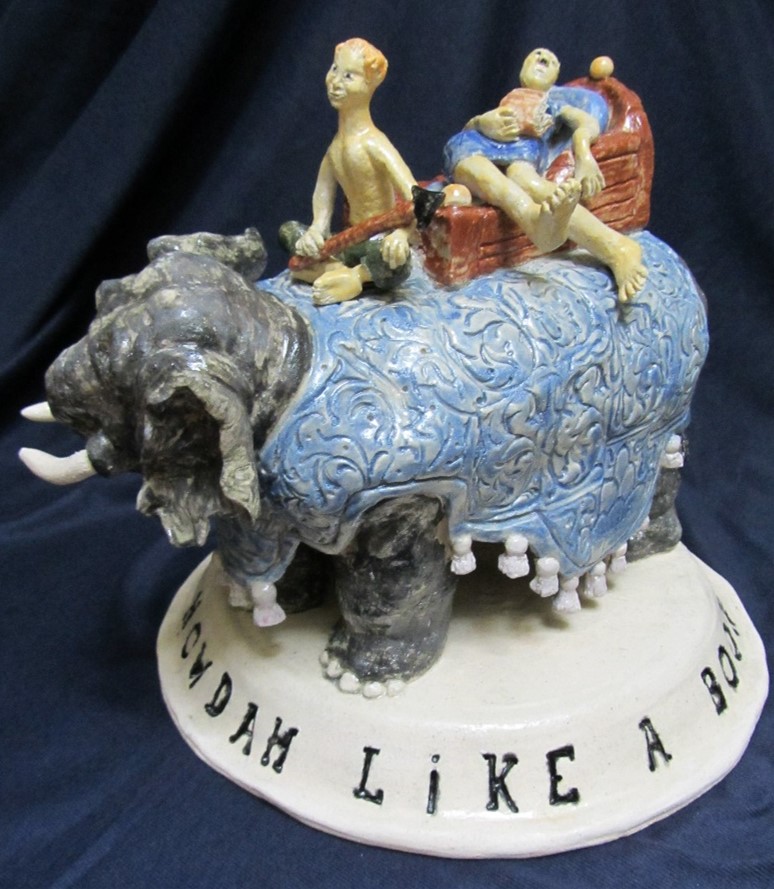
Since those courses with Matt Long I’ve exhibited a few times, at the Oxford Lafayette Library, the Bozarts Gallery in Water Valley, and in 2018 the Southside Gallery on the Oxford Square.
Brown: You have been teaching and writing about Tennessee Williams. Tell us about this.
Barbera: I would lecture on “A Streetcar Named Desire” and I figured my students would be familiar with that play, so I wanted to give them a new angle on it: the conflict between Stanley and Blanche as symbolizing the conflict between the two cultures they represent (the urban worker of the new South and the landed aristocracy of the old South).
In our English Department, Professor Louis Dollarhide taught a course just on Williams a number of times before he retired, and then Professor Colby Kullman picked up the baton. But I never wanted to teach a course just on Williams because I had so many other irons in the fire, and Williams wrote so much, and it would be so much work to get up such a course. Gradually, however, I got drawn into more and more scholarly work on Williams. After I retired I was invited to write a review of the poet William Jay Smith’s memoir, “My Friend Tom” for “The Southern Register.” My work on The Rose Tattoo led me to broader research on Italians in Williams’s plays and the history of Italians in Mississippi in general.
I gave two talks, at the invitation of the 2018 Clarksdale Tennessee Williams Festival on the separate histories in Mississippi of Sicilians and the people from the Marche region of central Italy. On campus, in October of 2019, I presented, with the help of others, the script I wrote for LGBTQ History Month. And now I’ve agreed to direct a Williams play for the evening of Williams one-acts to be presented by Theater Oxford, Oct. 6-8 at the Powerhouse. I’ve also agreed to act as dramaturg for all four of the one-act plays on the program, and to write program notes about the plays. We’re calling it Another Side of Tennessee Williams because it features some of his lesser known more upbeat work. I’m really excited about this program and think it will make for a great evening’s entertainment.
Brown: Where’s your favorite vacation destination and why is it your favorite?
Barbera: Well, there are many places I’d like to go, but I guess I can only select my favorite destination from places I’ve been. I’d say, for nature, Kauai. A dog-sitting gig on Kauai fell into my lap the summer I retired. It’s deservedly called “The Garden Isle.” I loved the vegetation, beaches, and tropical fruits – many of them previously unknown to me. I made a second trip there in 2015 with my former student and good friend, Jennifer Pace.
For culture I’d say my favorite vacation destination is Italy. I spent a month there traveling by car with Bill McBrien, starting in Rome and driving north, visiting Florence, Orvieto, Assisi, Siena, Lucca, the Cinque Terre, Bellagio, Venice, and many other towns with their churches, piazzas, and museums, all filled with art. I don’t know if I’ll ever get to travel south of Rome, but I’d like to.
Brown: How have you kept busy since retirement?
Barbera: The summer I retired I went to Kauai. The following year I went to Alaska to accompany my colleague and dear friend Colby Kullman on his last trip there before he retired. He’d been going for many years to a theater conference in Valdez, and we decided to turn it into a longer trip, visiting Homer, Seward, Anchorage, and other cities. We enjoyed a boat excursion in Prince William Sound to see a glacier calve, and to watch sea otters.
In Denali National Park we sat in a bus watching a grizzly bear guard her cubs from a pack of wolves who were eyeing the cubs from a distance. It was very dramatic. At first there were a few wolves, then they were joined by more, and finally there were 7 in all. It felt ominous, like the gathering of the birds in Hitchcock’s The Birds. The guide told us they were a well-known pack and wouldn’t dare attack the cubs while the mama grizzly was there.
In 2015 Colby and I took an auto trip to visit friends in West Virginia, South Carolina, and other states, and stopped to see the beautiful grounds and chapels of Sewanee, Tennessee, and the home of Flannery O’Connor (Andalusia Farm) in Milledgeville, Georgia. In 2018 I went with my dear friend Kay MacKenzie to Las Vegas, where we saw the enchanting Cirque du Soleil Beatles show, the Hoover Dam, and the Grand Canyon. Every Christmas I visit New York to see family, friends, take in theater and museums.
But Oxford is now my home, and, for this New Yorker, it has become a more and more felicitous place to live, with fine restaurants, two movie theaters and a film festival, the Ford Center, art galleries, and a flourishing arts scene. I love my house here, walking in Lamar Park, gardening, and having dinner parties or dining out with friends. I also have time now to read solely for pleasure. During Covid I also got together two or three times a week with Jennifer Pace and Colby Kullman for takeout and we’d watch programs from PBS that I’d recorded on my DVR, or stream shows available on my Roku. We call ourselves the Three Musketeers, but even before Covid we enjoyed each other’s company so much we decided to buy adjoining plots in the Oxford Memorial Cemetery.
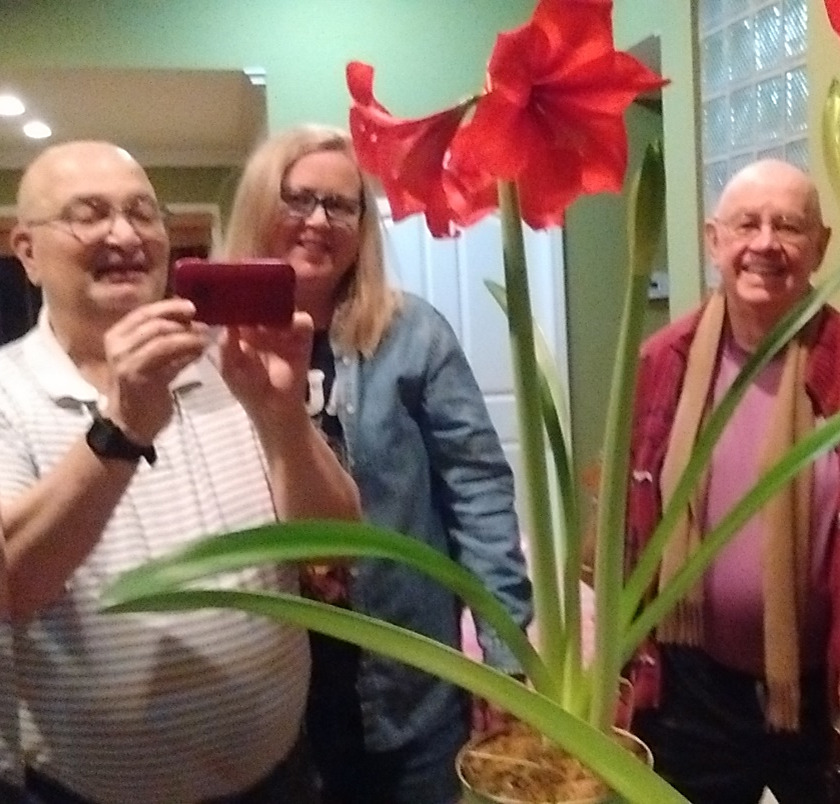
Brown: What is your legacy?
Barbera: As a scholar there are the books and essays I’ve written that may be of use to others.
As a teacher I had the privilege and pleasure of encountering students at a formative time and making a difference in their lives.
Recently my dear friend Colby passed away. After we purchased our adjoining cemetery plots, Colby and Jennifer Pace made arrangements to be cremated; they’d be sharing one plot. I requested that I be buried, unembalmed. I was told I could do that, but I’d have to be put in the ground within 24 hours. I then also requested that I be buried in just a sheet, and was told I couldn’t do that; I’d have to be in a box. So I asked for the cheapest one. Colby would often tease that I had to spend more for my full plot than he did for his half plot.
Because Colby and Jennifer opted for cremation, we decided Jennifer would throw her and Colby’s urns and I would sculpt the stems for the lids. Edward Gorey’s art inspired my sculpture for his urn, a decision of which he approved. I smile when I think of his ashes, now cradled by the urn Jennifer threw for him, and capped by my jaunty, Gorey-inspired, scarved and sneakered penguin.
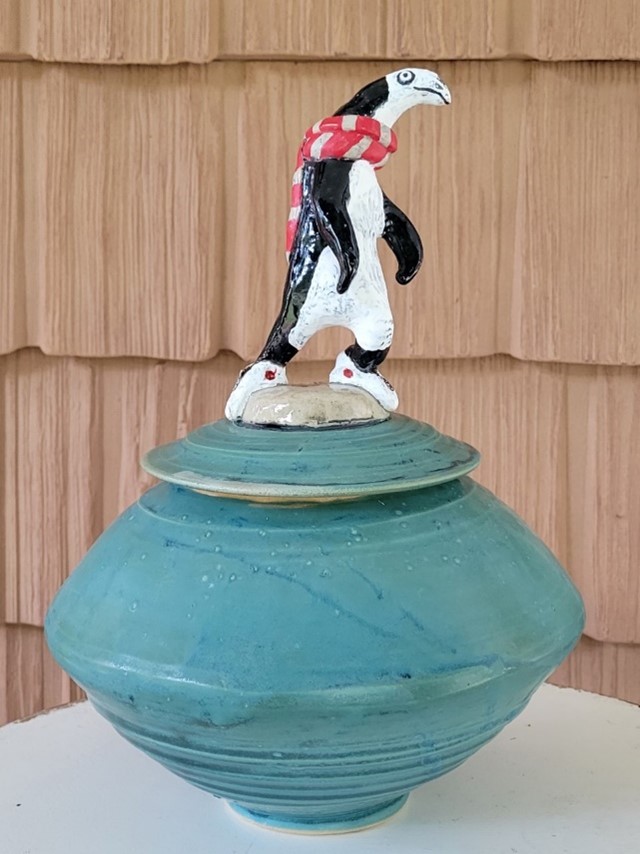
Bonnie Brown is a retired staff member of the University of Mississippi. She most recently served as Mentoring Coordinator for the Ole Miss Women’s Council for Philanthropy. For questions or comments, email her at bbrown@olemiss.edu.
Recent Comments